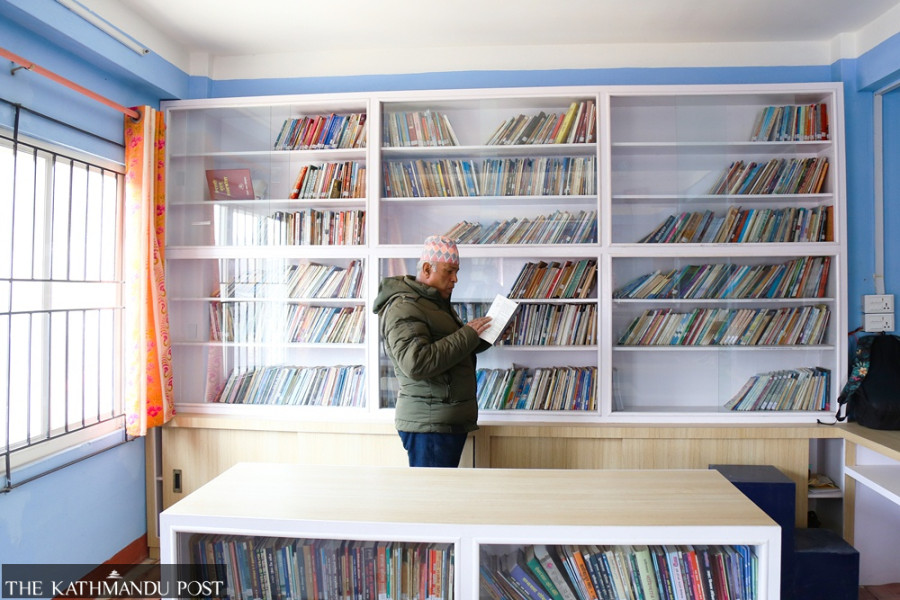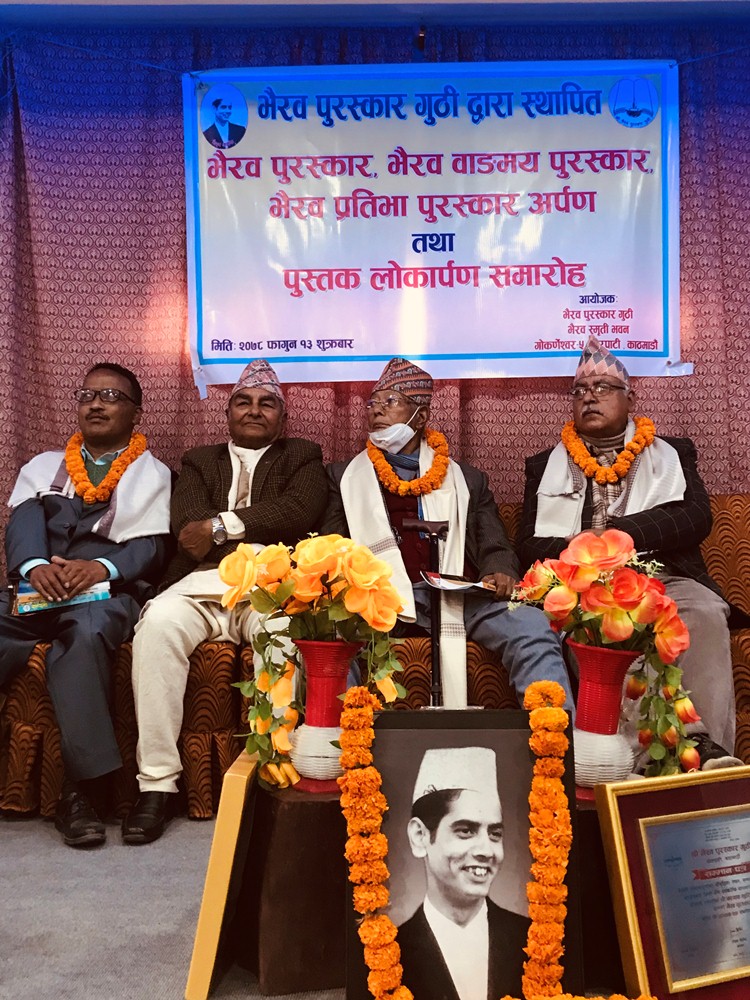Culture & Lifestyle
How a literary award is promoting satire genre in Nepali literature
Bhairab Puraskar Guthi, established in honour of satirist Bhairav Aryal, has been presenting literary awards to veteran and emerging Nepali satirists in the hopes of promoting the satire genre in Nepal.
Shranup Tandukar
Bhairav Aryal forever changed the satire genre in Nepal when he published his first satirical essay collection, ‘Kaukuti’, in 1962. Aryal, who showed equal talent in poetry and journalism as in satire, deftly wrote satirical essays aimed at universal human vices such as gluttony, greed, and pride. His magnum opus, ‘Jaya Bhundi’, a collection of ten satirical essays, was published in 1965 and contained his classic essays such as ‘Mapain’, ‘Jaya Bhundi’, ‘Bhramha Ji ko Prayogshalabata’ among others. More than 46 years after Bhairav Aryal’s untimely death, his satirical essays are still considered the pinnacle of satire in Nepali literature.
On September 30, 1989, the 51st birth anniversary of Bhairav Aryal, a celebration event was organised in the Chamunda Library, Jorpati. The event, attended by the renowned poet Kedar Man Vyathit and acclaimed painter and writer Ramesh Bikal, marked the beginning of Bhairab Puraskar Guthi. During the event, donations were collected from the attendees, and a guthi was formed to manage the funds to finance literary awards for the satire genre in Nepal.
Since its inception, the guthi has been managing two literary awards, the Bhairab Puraskar and the Bhairab Pratibha Puraskar. The Bhairab Puraskar is given to satirists who have contributed considerably to the satire field for many years, whereas the Bhairab Pratibha Puraskar is given to emerging Nepali satirists who show potential in the literary field. Along with presenting the literary awards, the guthi also operates a public library on its premises.
For ten years of its operation—from 1989 to 1999—the guthi was able to present the two literary awards annually, but from 2000, the two awards were given bi-annually due to lack of funds. The guthi, which is primarily financed by donations and the interest earned on the donations, was finally able to present the awards annually again from 2020.
“There hasn’t been a satirist like Aryal who can come close to his wit and humour till now,” says Rochak Ghimire, 81-year-old, chairperson of Bhairab Puraskar Guthi. Ghimire, who was a close friend of Aryal for 17 years, is also the chief editor of ‘Rachana’, a bimonthly Nepali literary magazine. “The awards help to preserve the legacy of Aryal, and they also encourage Nepali satirists to continue in the satire sector.”
Along with the Bhairab Puraskar Guthi, there are other organisations that also focus on the humorous satire and satire field in Nepal. The other notable organisation is the Basudev-Bidadev Luitel Guthi, established in 1993, which presents awards in three categories: theatre, literature, and cartoon. The Bhairab Puraskar Guthi itself was also presented with the Basudev-Bidhadev Luitel Puraskar on September 8, 2018, for its contribution to the humorous satire field in Nepali literature.
Over the years, many renowned Nepali literary figures like Madan Krishna Shrestha, Hari Bansha Acharya, Mohan Raj Sharma, and Chuda Mani Regmi, among others, have received the Bhairab Puraskar. This year, Naranath Luitel received the Bhairab Puraskar, whereas Bimal Bhaukajee received the Bhairab Pratibha Puraskar. The Bhairab Puraskar carries a purse of Rs 111,111, whereas the Bhairab Pratibha Puraskar has a purse of Rs 51,111.
Luitel, who is now 63 years old, has been involved in the literary satire scene for more than three decades. Born in Jhapa, Luitel credits the support of his teachers in his school Janta Middle School for fostering his interest in literature. Initially penning short poems, Luitel soon moved onto the satire genre because of its ability to make people laugh as well as think. Luitel has penned 24 literary works till now—including essay collections, criticisms and short stories—eight of which are in the satire genre. He is also the chief editor of ‘Fitkauli’, an online Nepali comedy magazine.
“To be honest, I never expected that I would receive this award. But I am happy that my contributions have been acknowledged,” says Luitel. “Receiving an award established in the honour of the great satirist Bhairav Aryal is the highest prestige I have received. Even some of my teachers who inspired me called me to congratulate me.”

Phanindra Raj Niraula, assistant professor at Padma Kanya Campus who teaches Nepali to graduate students, also asserts that the Bhairab Puraskar is a prestigious award since it is associated with the greatest Nepali satirist.
“Literary awards not only present financial rewards to authors but also give them prestige and honour. The Bhairab Puraskar definitely helps promote Nepal's satire genre,” says Niraula. “In Nepal, most satire works get confined in the essay format when we can explore satire in the short story, anecdote, folktale, and other diverse literary forms. We need to encourage authors to also experiment with satire in different forms other than essays.”
This year, the guthi also introduced a new category of award, the Bhairab Wangmaya Puraskar, which carried a purse of Rs 101,111. It was given to Tejeshwor Babu Gwang, a culture expert. This award is meant to broaden the scope of the guthi to promote other genres of literature as well as art, music, journalism, etc., instead of only satire, says Basanta Rijal, secretary of Bhairab Puraskar Guthi.
“Even though Bhairav Aryal is known primarily for his satire works, he was an equally talented journalist and poet,” says Rijal. “That’s why we [the guthi] thought that we should expand our scope, too.”
A narrow slanted lane descends to Devkota Park from Sahid Smriti Park in Gokarneshwor, Jorpati. Near the base of the descent and midway between the two parks lies an inconspicuous building owned by Bhairab Puraskar Guthi. Light blue painted and three-storeyed, the building houses various shops on the ground floor—a clothes shop, a computer repair shop, and a grocery shop. Renovations on the building were completed only two months ago, which added a third floor to the building, containing a wide-open hall.
“In the current state, we earn a decent sum from leasing the ground floor so we no longer face problems financing the awards regularly again,” says Rijal. “We are even planning to advertise for manuscripts of satire works from all over Nepal and help potential authors to publish their works.”
The guthi is the publisher of six books—poem collections, memoirs, essay collections, etc., of Bhairav Aryal—for now: ‘Tedho Aina’, ‘Nepali Hasyabyangya Kabita’, ‘Karindako Dincharya’, ‘Bhairav Aryalko Hasyabyangya’, Saswat Byangyasilpi’, and ‘Samjhana’.
Though there are still active Nepali satirists who regularly produce satire works, the popularity of the satire genre in literature has waned in recent years, admits Ghimire.
“Satire isn’t simply cheap humour. A satire work needs to target the actions and vices of immoral persons instead of the person itself,” says Ghimire. “Over the years, there have been many good satirical works, especially those targeting politicians, but the ones getting satirised haven’t shown any changes in their behaviour at all.”
In light of the need to promote the satire genre, the guthi is focusing on the educational sector, from the primary level to the PhD level. The literary personalities the Post spoke to say that satire works in Nepal are slowly losing the humour element and simply being satire only. They say that it has resulted in satire works losing their nuances and wittiness.
“We are planning to organise essay competitions in schools to develop an affinity for literature in children. Aryal was highly proficient in Sanskrit, and I think that having proficiency in language can help you to create high-quality satires,” says Rijal. “In our universities too, we are planning to encourage PhD students to pursue their PhD in satire by offering them scholarship packages.”
The guthi is also trying to expand the reach of Aryal’s work to the international arena by translating the late satirist’s works into English, but the initiative hasn’t turned out to be easy. They have approached Nepal Academy and are in the process of moving ahead with the translations.
“It is actually extremely difficult to translate a satirical work into another language,” admits Ghimire. “Similar to poetry, a satirical work contains a sort of non-transferable essence in its original language. The proverbs, puns, play on words, and the flow of the work itself often doesn’t translate well.”
While literary endeavours and authors usually bemoan a lack of support from the government, the Bhairab Puraskar Guthi has a completely opposite viewpoint. When the guthi was initially formed, it didn’t have its own office or dedicated space, and it used to have meetings in the house of Devi Sharma, the then treasurer. The support of the local government and local representatives to the establishment and continued existence of the guthi has been instrumental, says Rijal.
“Chakra Bahadur Thakuri, the then VDC chairman of Gokarna, provided land for the guthi, whereas Gopal Baral, the chairman who succeeded Thakuri, provided additional funds for us to construct a three-room building for our guthi,” says Rijal. “If the local administrations and the government do their part in promoting and preserving the literary works and figures in Nepal, then we can excel in the literature sector. After all, there is no lack of literary skill and talent in Nepal.”




 9.89°C Kathmandu
9.89°C Kathmandu

.jpg&w=200&height=120)













